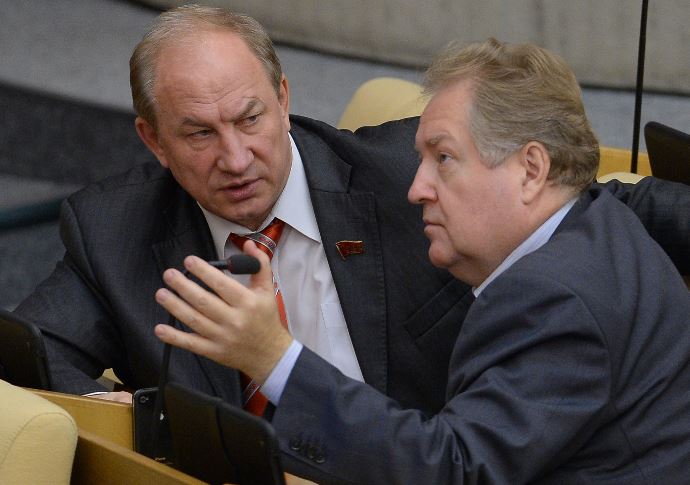
Bid to deploy Russian missiles in Cuba is seen as blustering
Two Communist Party deputies at the Russian Duma have asked the Russian government to deploy Russian missiles in Cuba and reopen a signals interception center in the Cuban city of Lourdes “to defend Russian interests,” the Russian daily Pravda reported on Wednesday (April 27).
The deputies, Valeriy Rashkin and Sergei Obukhov (in photo at top, Rashkin on the left), sent their appeal to President Vladimir Putin, Foreign Minister Sergei Lavrov, and Defense Minister Sergei Shoigu.
Their action was in response to a Reuters report that the United States planned to deploy HIMARS rocket launchers in southeast Turkey as early as May. The Russian government has always been wary of U.S. encroachment near the nation’s borders.

The deployment of HIMARS (High Mobility Artillery Rocket System) will reportedly serve to repulse attacks against Turkey from Islamic State forces in Syria.
“It should be noted that the tactical and technical characteristics of this equipment allows the use of missiles with range up to 500 kilometers,” the two Russian deputies’ statement said. “Thus, a potential threat to Russia’s allies under the Collective Security Treaty Organization is created.”
Armenia, where Russia maintains military bases, would be in harm’s way, the statement said. So, retaliatory measures were in order.
“We are talking about the deployment of Russian launchers with the same or even longer range in Cuba,” they proposed. “In addition, an asymmetrical response to Washington, such as reopening the signals intelligence center at Lourdes, seems to be called for.”

The measures could be taken under the existing friendship-and-cooperation treaty between Russia and Cuba, they added.
According to the RT [Russia Today] news service, the recipients of the deputies’ message have not yet issued a comment, but Vladimir Dzhabarov, deputy chief of the Senate Committee for International Relations, said that, in his view, the proposal is simply grandstanding.
“First, the situation in Cuba is different now; they have restored diplomatic relations with the United States,” he said. “Second, placing missiles there would have no effect on our security. Therefore, this is just a populist proposal that hardly matches the interests of our country’s security.”
Obukhov and Rashkin are identified with the orthodox end of the Russian Communist Party.
Rumors about reopening the radio-monitoring facility at Lourdes have surfaced since its closure, but Russian diplomats and officials reject them as attempts to spoil relations between Cuba, the U.S. and Russia. President Putin himself rejected that option during a visit to Brasilia in July 2014, saying that Russia “can meet its national defense needs without this component.”
In addition, in most observers’ opinion, it is unlikely — one might say unthinkable — that the Cuban government would even consider allowing Russian missiles back on its soil after the 1962 experience.
As RT recalls, “the Soviet Union put 40 nuclear-capable ballistic missiles on Cuba in 1962 in reply to the United States’ deployment of their medium-range Jupiter missiles in Turkey. Tensions quickly escalated into the so-called Cuban Missile Crisis and many experts agree that the two nations were very close to a full-scale nuclear war. The ensuing talks ended in mutual removal of the weapons from both Turkey and Cuba.”
Now that Cuba and the U.S. are engaged in a positive dialogue, any offensive moves, such as the ones proposed by the two Russian politicians, would be most counterproductive.

